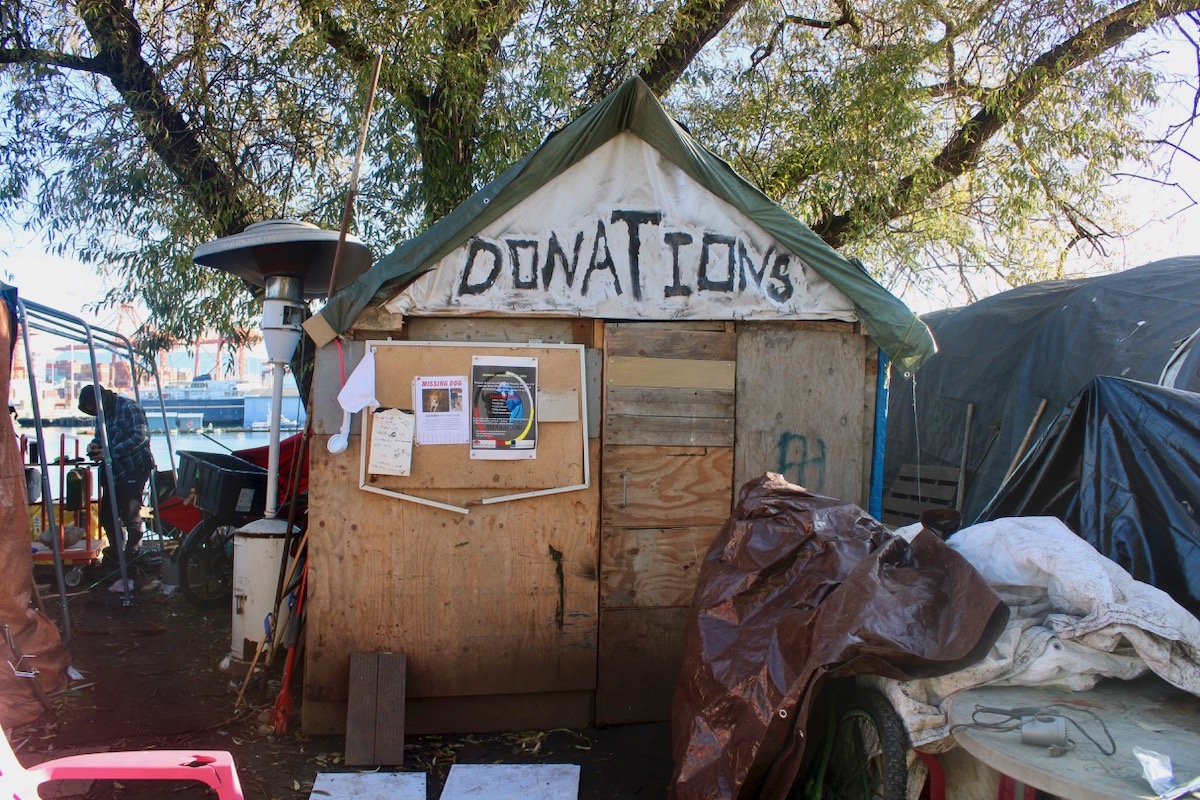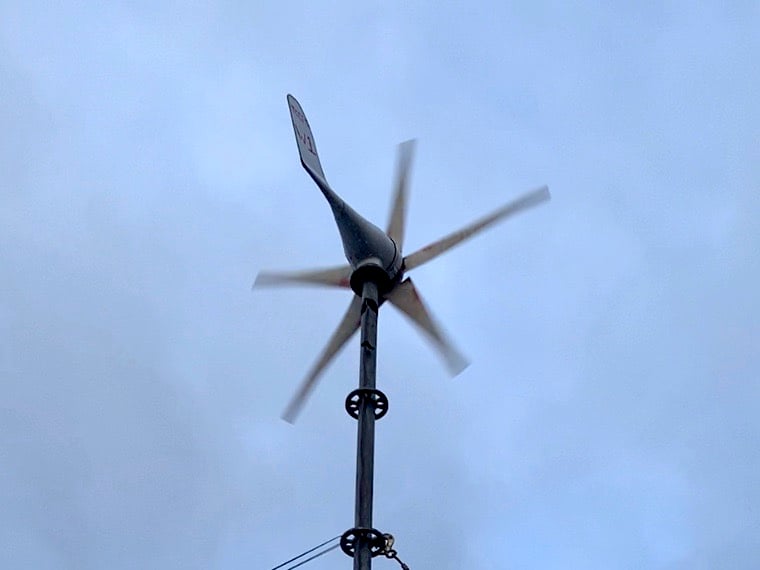The wind turbine went up a few days after Christmas, white blades whirring against the blue winter morning sky.
It generates a small amount of electricity, although more equipment is needed to deliver and store more power. But for the 30 residents of a tent city at CRAB Park, power sources like solar panels and wind power could help heat hot water for handwashing, light dark tents during the winter months and charge phones.
“The idea came from residents and former residents a year ago,” said Fiona York, a supporter of the tent city.
“When people are living outdoors and you give them that little bit of stability... you start thinking long term about resources and setting things up that are workable.”
Tent cities have been growing across Canada as more people became homeless during the COVID-19 pandemic and as housing costs spiked. In response, cities have been mounting aggressive decampments to force people to move along.
Last week in Edmonton, police moved in to remove an encampment during -30 C weather, leading to arrests and tent removals.
Park rangers and police in Vancouver also forced people living in Oppenheimer Park to move, even though temperatures were forecast to drop to -12 C.
Officials have said they want people to go to shelters instead of living outdoors. In Edmonton, police and some politicians have said it’s been necessary to take people’s tents away because the encampments are dangerous.
But for various reasons, some people avoid homeless shelters — because of past trauma, safety fears, not wanting to leave pets behind, or other bad experiences. Often, there simply aren’t any shelter spots available.
For years, York and other tent city supporters in Vancouver have tried to persuade the city and park board to provide services such as better washrooms, and access to water and electricity. The tent city at CRAB Park was able to get access to an electrical outlet near the park two years ago.
That access occurred shortly after a B.C. Supreme Court ruling that found that the quality and suitability of alternative housing offered to residents at CRAB Park need to be considered before the park board could enforce bylaws requiring people to pack up their tents and move every morning.
Supporters of CRAB Park’s tent city say that ruling led to the encampment becoming “the first legal outdoor sheltering area” in Canada.
York says getting access to that power outlet has been helpful to provide power to heat a water dispenser so residents can wash their hands with hot water — an important measure to prevent the spread of illness.
Residents also use the power outlet to charge their phones, or have small solar panels to power lights so they can read at night.
“There's one senior who had a little light so he could read a book at night, and another resident had his lighting and he had his little guitar, his phone, and he'd always be listening to podcasts,” York said.
“It just is something that can be done. It makes sense.”
Tent city supporters are currently trying to fundraise $750 to fully equip the wind turbine and increase the amount of solar energy available in the camp.
That power likely won’t be enough to provide heat — one of the most important needs for tent cities in the winter and one of the reasons tent cities get shut down, because using propane or candles increases the risk of fire. On Christmas Day, a man camping by himself under Canada Place, just blocks away from CRAB Park, died when his tent caught fire, just one of several similar tragedies that have happened across Canada this winter.
“The first idea is more just centralized charging [for] phones and devices and lighting,” York said. “Then if it was robust enough or has enough power, then conceivably it could be for heating options, or fans in the summer.”

CRAB Park is currently the only site in Vancouver where people can camp permanently and not have to move their items by 8 a.m. While other long-lasting encampments have had issues with violence, injuries and conflicts with neighbours, CRAB Park has mostly steered clear of those problems.
But the tent city is limited to a specific area of the park, and if people try to set up tents outside that area, police and park rangers will tell them to leave. In November, park supporter Emily Luba was briefly detained by police when she moved to intervene as a resident refusing to leave his tent got upset and hit police officers and rangers with his tent.
Last week, park rangers also tried to prevent volunteers from installing a tiny home at the encampment.
Services are still inadequate at CRAB Park, York said. People don’t have access to showers, and camp residents and supporters have taken on the task of setting up a warming tent for the winter.
In December, the BC Human Rights Tribunal agreed to fast-track a complaint submitted by CRAB Park residents. They allege an “ongoing denial of basic services at CRAB Park and the impact on the group of people residing there.” Residents say the denial of services is discriminatory “based on Indigenous identity, race, colour, ancestry, place of origin, physical and mental disability, sex and age.”
When it comes to the provision of electricity, York said supporters of the CRAB Park tent city often make the comparison to refugee camps.
“One of the first things of course is they provide electricity, because they recognize that everything is based off that and it can make the difference,” York said. ![]()
Read more: Energy, Rights + Justice, Housing

















Tyee Commenting Guidelines
Comments that violate guidelines risk being deleted, and violations may result in a temporary or permanent user ban. Maintain the spirit of good conversation to stay in the discussion and be patient with moderators. Comments are reviewed regularly but not in real time.
Do:
Do not: